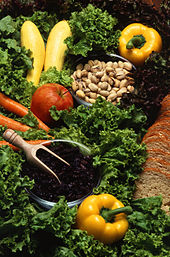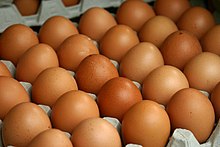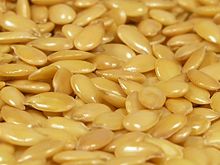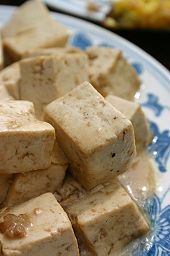

|
|
|
||
| Line 87: | Line 87: | ||
==See also== |
==See also== |
||
* [[Vegetarian cuisine]] |
* [[Vegetarian cuisine]] |
||
* [[Vegan nutrition]] |
|||
* The [[China–Cornell–Oxford Project]] in the 1980s |
* The [[China–Cornell–Oxford Project]] in the 1980s |
||
* [[The China Study]] done 2005 |
* [[The China Study]] done 2005 |
||

Vegetarian nutrition is the set of health-related challenges and advantages of vegetarian diets.
Appropriately planned vegetarian diets are healthful and nutritionally adequate for all stages of the human life cycle, including during pregnancy, lactation, infancy, childhood, and adolescence.[1] However, vegetarian diets deficient in vitamin B12 or calories may compromise children's health and development.[1][2] The UK National Health Service recommends that vegetarian diets should also follow the general recommendations for healthy diets, such as low fat, salt and sugar intakes and 5 fruits or vegetables a day.[3] Qatar's public health ministry states, "One cannot be a healthy vegetarian by going to a fast food restaurant and ordering french fries and soda!".[4]
Vegetarian diets tend to be rich in carbohydrates, omega-6 fatty acids, dietary fibre, carotenoids, folic acid, vitamin C, vitamin E, potassium and magnesium. They are possibly low in saturated fat, cholesterol, and animal protein.

Despite the long-standing, widespread belief that vegetarians must consume grains and beans within a short time to make a complete protein that contains all 9 essential amino acids that must be supplied through diet, this has never been substantiated by research. The protein-combining theory was brought to popular attention after being promoted in Frances Moore Lappé's 1971 bestselling book Diet for a Small Planet. In later editions of the book, starting in 1981, Lappé withdrew her contention that protein combining is necessary.[5]
Plant foods rich in protein include soy beans and soy products such as tofu, veggie burgers, and soy milk; other legumes; nuts and seeds; and cereal grains.[6]
Vitamin B12 deficiency can be extremely serious and lead to megaloblastic anemia, nerve degeneration and irreversible neurological damage.[7]
Vegetarians may get vitamin B12 from eggs and dairy products (milk, cheese, etc.);[8] for some, this is adequate, while others may still remain B12-deficient.[1] More broadly, according to the Academy of Nutrition and Dietetics, even the form of vitamin B12 sourced from animal products is protein-bound and not as easily digested as supplements, especially as people age, and therefore B12 supplementation is recommended for everyone over the age of 50.[1] Pregnant and lactating vegetarian mothers—and breastfed infants if the vegetarian mother's diet is not supplemented—should also use supplements, whether B12-pills, B12-injections, or B12-fortified foods, if they don't get adequate vitamin B12 from animal products like eggs or dairy.

Generally, humans need 2.4 to 3 micrograms of vitamin B12 each day.[8] There are cases to suggest that vegetarians and vegans who are not taking vitamin B12 supplements or food fortified with B12 do not consume sufficient servings of B12 and have abnormally low blood concentrations of vitamin B12.[9][10] This is because, unless fortified, plant foods do not contain reliable amounts of active vitamin B12.[1]
It is essential, therefore, that vegetarians consume adequate amounts of dietary supplements or foods that have been fortified with B12, such as vegetable stock, veggie burger mixes, textured vegetable protein, soy milks, vegetable and sunflower margarines, and breakfast cereals.[7]B12 used in these foods or supplements is typically grown from vegan sources (such as bacteria). Soybeans and barley seeds from plants grown in soils amended either with cow dung (which is rich in B12) or with pure B12 had a higher B12 content than those grown without this supplementation.[11]

Vegetarian diets can be low in omega-3 fatty acids (O3FAs). Major vegetarian O3FA sources include algae, hempseeds and hempseed oil, walnuts, flaxseeds and flaxseed oil, olive oil, canola oil, avocado, and chia seeds.[citation needed]
A potential problem is that vegetarian diets lacking eggs or generous amounts of edible seaweed generally lack a direct source of long-chain O3FAs such as eicosapentaenoic acid (EPA) and docosahexaenoic acid (DHA). Vegetarian diets may also have a high ratio of omega-6 fatty acids to O3FAs, which inhibits the conversion of short-chain fatty acids such as alpha-Linolenic acid (ALA), which is found in most vegetarian O3FA sources, to EPA and DHA.[1] Short-term supplemental ALA has been shown to increase EPA levels but not DHA levels, suggesting poor conversion of the intermediary EPA to DHA.[12] To remedy this, DHA and EPA supplements derived from microalgae are available.[1]

There is only weak evidence that O3FAs benefit cardiovascular health,[13] and although O3FAs have been thought useful for helping to alleviate dementia, as of 2016[update] there is no good evidence for their effectiveness in this regard.[14]
While there is little evidence of adverse health or cognitive effects caused by DHA deficiency in adult vegetarians, fetal and breast milk levels remain a concern for pregnant or lactating mothers.[12] EPA and DHA supplementation has been shown to reduce blood platelet aggregation in vegetarians, but a direct link to cardiovascular morbidity and mortality, which is already lower for vegetarians, has yet to be determined as of 2000[update].[15]
In general, lacto-ovo-vegetarians have a relatively high intake of calcium that meet or exceed calcium recommendations.[16]
A 2022 review found no significant difference in calcium intake between vegetarians and omnivores.[17] Vegetarians can obtain calcium from dairy products, calcium-fortified plant milks, almonds, figs, oranges, calcium-set tofu as well as low-oxalate vegetables such as bok-choy, kale and turnip greens.[16]
Compared with omnivores, vegetarians tend to have a lower bone mineral density (BMD) but not a higher fracture rate.[18][19]
Vegetarians are more likely to have lower iron stores compared with non-vegetarians and have a higher risk of iron deficiency anemia.[20][21][22]

The recommended iron intake for vegetarians is 180% that of nonvegetarians due to the bioavailability of non-heme iron.[16] Although a lower percentage of non-heme iron is absorbed by the body, greater total amounts of non-heme iron are concentrated in many non-meat sources of iron, and therefore breakfast cereals, eggs, nuts, seeds, and legumes (including soy foods, peas, beans, chickpeas, and lentils) are significant sources of iron, and a well-planned vegetarian diet should not lead to iron deficiency.[16][23][24]
Non-heme iron is more sensitive to both inhibitors and enhancers of iron absorption: Vitamin C is an iron absorption enhancer; the main inhibitors for most people are phytates (e.g. legumes and cereal grains), but other inhibitors include tannins (from tea and wine), calcium, and polyphenols.[1]
Iron is an integral part in the chemical structure of many proteins and enzymes, which maintain good health. In humans, iron is an essential component of proteins involved in the transport of oxygenofred blood cells. Iron also helps regulate cell growth and cellular differentiation.[25]
A 2013 review found that zinc intake and serum zinc concentrations were significantly lower in populations that follow vegetarian diets compared with non-vegetarians.[26]
Phytates in many whole grains, and dietary fiber in many plant foods may interfere with zinc absorption, and marginal zinc intake has poorly understood effects. Vegetarians may need more than the US Recommended Daily Allowance of 15 mg of zinc each day to compensate if their diet is high in phytates.[1] Major plant sources of zinc include cooked dried beans, edible seaweed, fortified breakfast cereals, soy products, nuts, peas, and seeds.[1]
One study reported a "potential danger of [iodine] (I) deficiency disorders due to strict forms of vegetarian nutrition, especially when fruits and vegetables grown in soils with low [iodine] levels are ingested."[27] Iodine, however, is usually supplied by iodized salt and other sources in first world countries. Other significant vegetarian sources of iodine include edible seaweed and bread made with dough conditioners.[1]
Evidence suggests that vegetarian diets have beneficial effects on blood lipids and that vegetarians have a reduced risk of cancer, cardiovascular disease, hypertension and type 2 diabetes.[22][28][29][30]
{{cite web}}: CS1 maint: url-status (link)
{{cite journal}}: CS1 maint: multiple names: authors list (link)
{{cite journal}}: CS1 maint: multiple names: authors list (link)
{{cite journal}}: CS1 maint: multiple names: authors list (link)
{{cite journal}}: CS1 maint: multiple names: authors list (link)
{{cite journal}}: CS1 maint: multiple names: authors list (link)
{{cite journal}}: CS1 maint: multiple names: authors list (link)
{{cite journal}}: CS1 maint: multiple names: authors list (link)
{{cite journal}}: CS1 maint: multiple names: authors list (link)
{{cite journal}}: CS1 maint: multiple names: authors list (link)